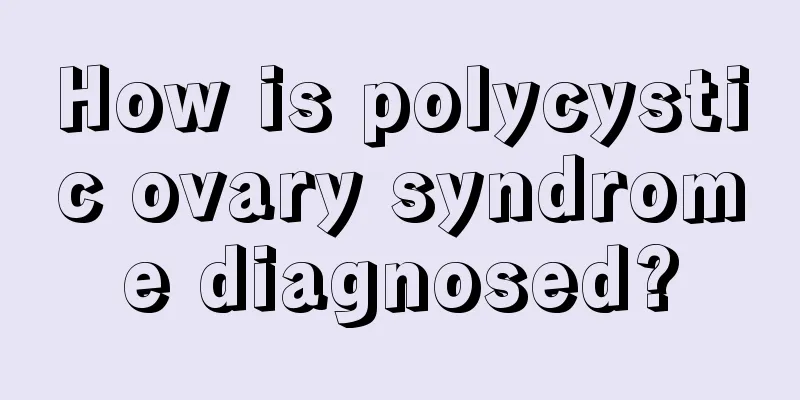How is polycystic ovary syndrome diagnosed?

|
Everyone will be troubled by illness to some extent throughout their life, but the degree of illness and the dangerousness of the disease vary. Colds and fevers are common household diseases. A large number of people fall ill every time the season changes, but they recover quickly. But some diseases can cause people to lose many functions and have a great impact on their lives. Polycystic ovary syndrome is one of them. Today I will tell you how to diagnose polycystic ovary syndrome. The examination of polycystic ovary syndrome includes the following aspects. 1. Body temperature check: If a woman's body temperature is generally single-phase, it can be basically determined that her ovaries may not ovulate. 2. Ultrasound examination: Ultrasound examination shows that both ovaries are polycystic and enlarged, with thickened and echogenic capsules. A large number of them can be seen under the capsule, with a diameter of 2~7mm. 3. Hormone measurement: If you suffer from this disease, the six sex hormones, namely follicle-stimulating hormone, luteinizing hormone, estradiol, progesterone, testosterone, and prolactin, will deviate from normal values. The most notable feature of PCOS is anovulation. Since there is no ovulation, the ovaries only secrete estrogen and androgen, but not progesterone. Estrogen stimulates the proliferation of the endometrium. Progesterone causes a secretory response in the endometrium. If the endometrium is affected by estrogen for a long time without the effect of progesterone, endometrial hyperplasia and endometrial cancer will occur, endangering women's health. Hyperandrogenism is another important characteristic of PCOS. The ovaries of patients with polycystic ovary syndrome secrete large amounts of androgen, which causes them to show symptoms of androgen excess, including growing beards, excessive pubic hair, and excessive acne. These conditions may adversely affect a woman's appearance. Diseases like polycystic ovary syndrome not only affect women's normal physiological activities, but the symptoms of hirsutism also affect women's appearance, causing many women to have inferiority complex. But the disease is uncontrollable, and women don’t need to feel inferior. We should pay attention to prevention in normal times, rather than trying to treat the disease after it is discovered. Developing healthy living habits can effectively prevent many diseases. |
<<: Is polycystic ovary syndrome easy to treat?
>>: What are the symptoms of mild PCOS?
Recommend
Can girls grow taller by drinking milk?
Many people usually want to increase their height...
Numbness in arms during sleep during early pregnancy
It is said that marriage is a major event in a wo...
How many days does it take for a biochemical abortion to be clean?
Some women will have biochemical miscarriage duri...
What brand of folic acid should I take to prepare for pregnancy?
For women preparing for pregnancy and during preg...
14 week fetus picture
The 14th week of pregnancy belongs to the second ...
What is the difference between custard and cream? How to fix the problem of cream becoming thinner as you beat it?
Adding a certain amount of cream to desserts can ...
10 Benefits of Salt for Detoxification and Beauty
Salt has the effects of deep cleansing, steriliza...
Will I bleed the first time?
Many people believe that women will bleed after h...
How to judge whether photovoltaic panels are good or bad? Is photovoltaic power generation a new energy source?
New energy, also known as unconventional energy, ...
Can eating more duck eggs lower blood pressure? The truth is...
Rumor: "People with high blood pressure shou...
What are the benefits of eating bacon? Should bacon be refrigerated or frozen?
Bacon itself is a meat product, containing a lot ...
How long does it take for a gestational sac to form?
The gestational sac is the first thing that is de...
A few days after the miscarriage, I started bleeding again
After a miscarriage, women's bodies are usual...
What materials are best for injectable rhinoplasty? If you love beauty, you should take a look.
The shape of the nose affects the beauty of the e...
Why did the Forbidden City cancel the New Year's Eve dinner? Are there any reservations for the Forbidden City New Year's Eve dinner in 2020?
A few days ago, after the Forbidden City launched...









